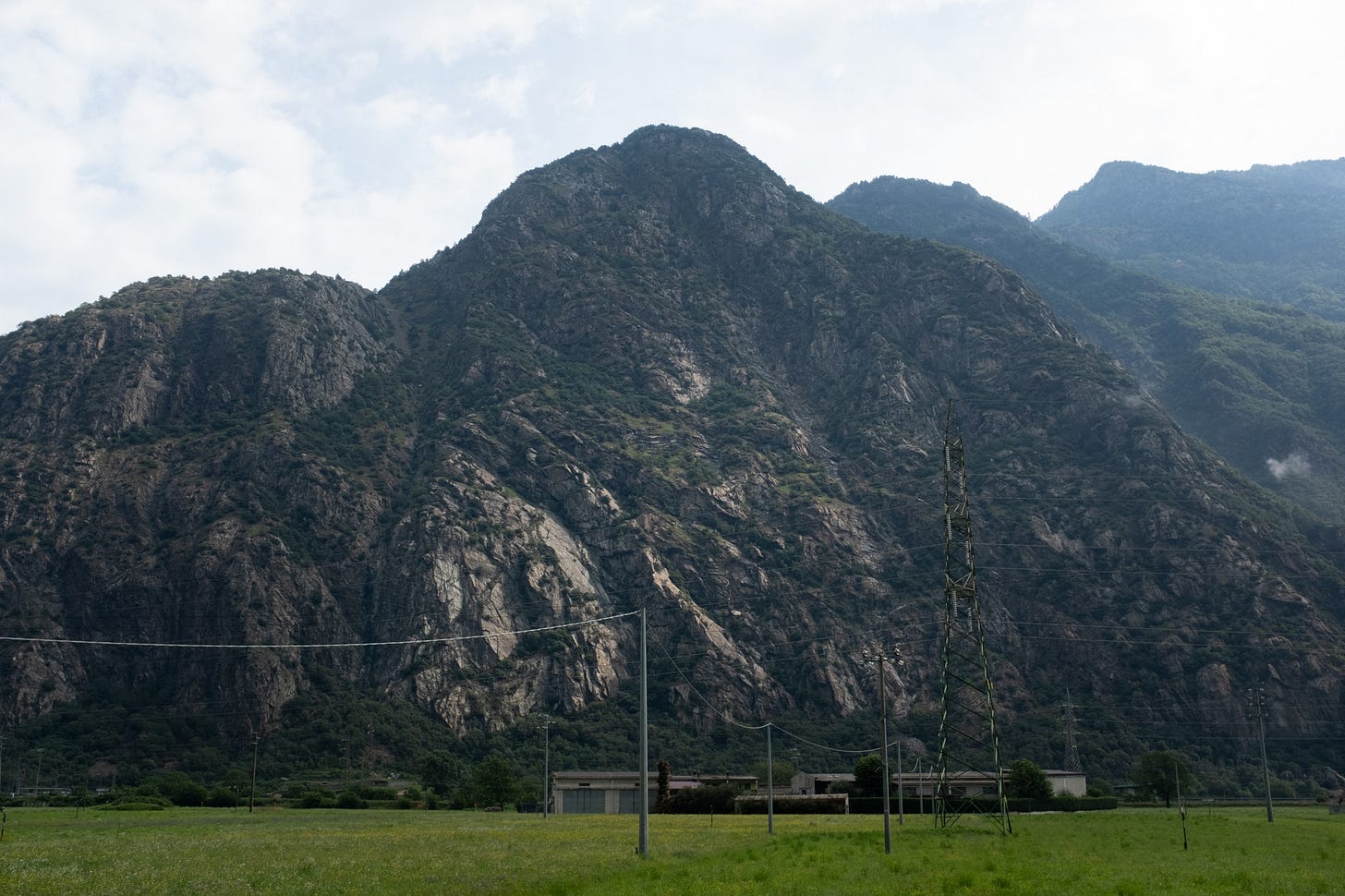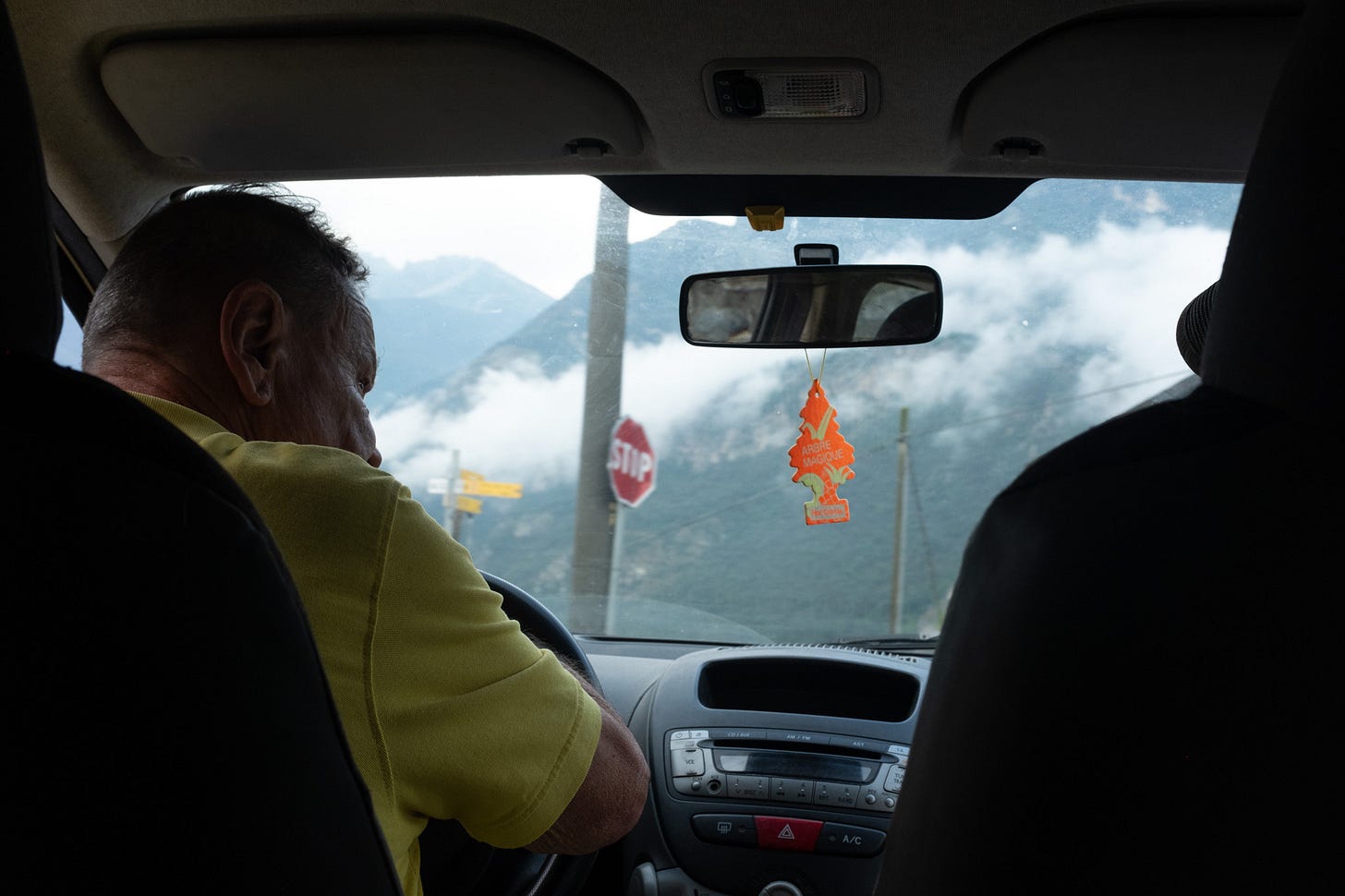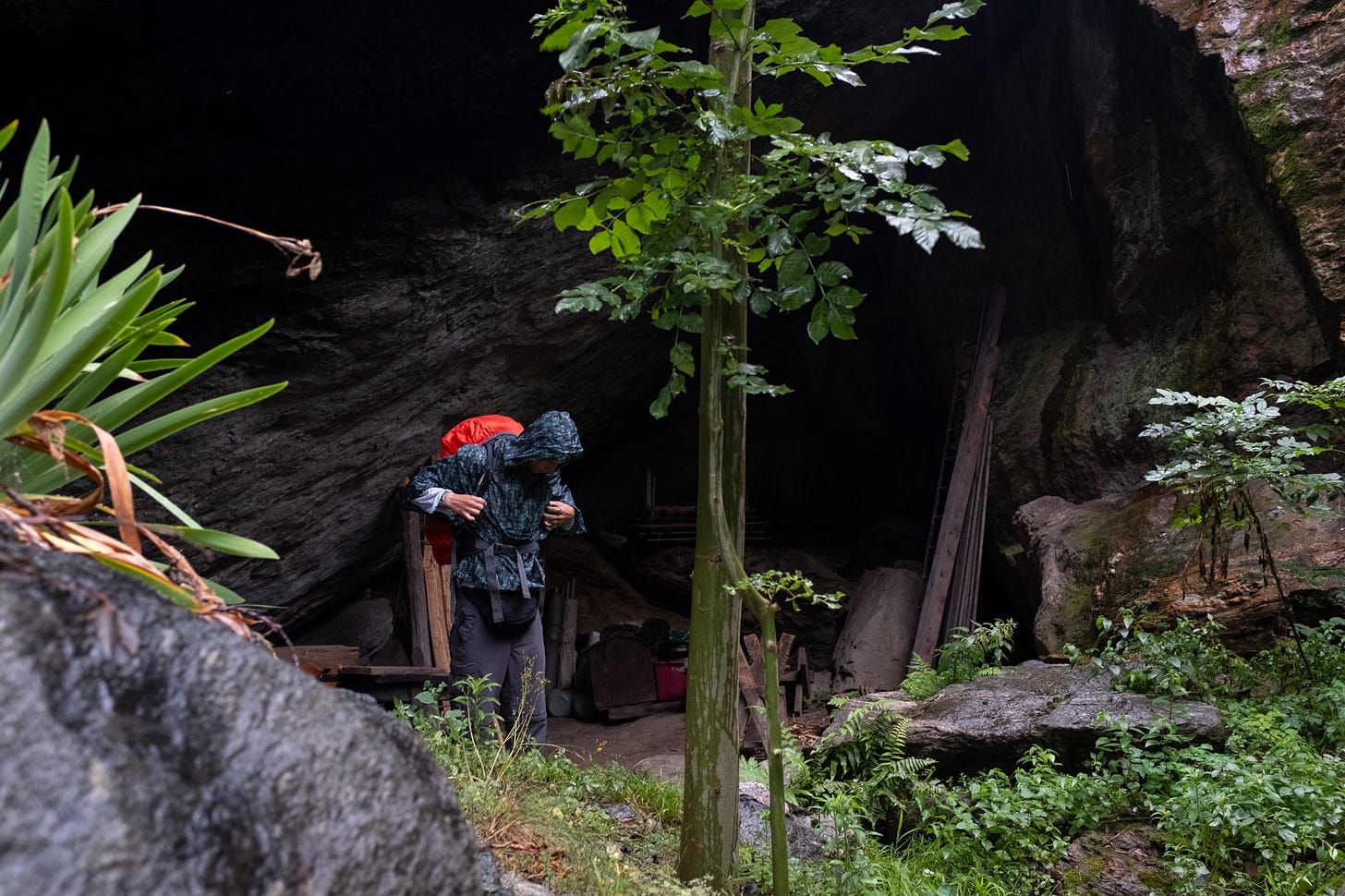Was this hitchhiking? I suppose not. We had phoned her after all. Ornella was revving the tiny Fiat, chattering away somewhere between Italian and English. She’d driven us clean out of the town and was taking us back on ourselves, back up the valley down which we’d spent a hard day’s walking. We skirted a glistening rockface and ran alongside the motorway, pulling into the village. All the while we spoke about Padre Stephano, our host at the convent the night before and the man who’d given us Ornella’s number.
“Padre Stephano…Sympatico!” She chirped, “Magnifico!”
“Ahh multi gentilo!” My brother and I replied, offering a few more Italianised adjectives for the padre.
“Here!” She announced merrily as we swung into a parking space on the hillside. She leapt out and lead us up a narrow drive. “My brother lives here,” she pointed to a house with dark brown frames, “my mother and father, there. My whole family here!” She had long ago moved to Verres, the town she had picked us up from, and used her old house here as a kind of hostel for pilgrims. She made good trade.
“This is the chicken,” she said as we entered the kitchen. It was sweltering, having caught the sun all day, “The chicken is very hot I’m sorry. And downstairs the bedroom.” In contrast to the kitchen, or chicken as Ornella called it, the downstairs was lovely and cool. There was a powder pink bathroom with a huge bath and the bedrooms had a plug-in airconditioner. It was a pilgrim paradise.
Ornella wheeled back down the hillside to Verres, saying she’d pick us up in the morning at whatever time we wanted. We’d said 9 would be perfect.
I bathed and rubbed talcum powder on my wrinkled blistering feet. Then we bought some wine, cooked a mountain of pasta and sat on the terrace watching the sky and the mountains turn purple and the distant orange pricks of habitation coruscating on the hillside. There was some opened wine under the sink, left by previous pilgrims and we drank that too. It was a little sour, maybe a day or two past it, but it all helped with the aching legs and shoulders.
With sore heads, we weren’t ready for Ornella’s 9 o’clock start. She strode into the chicken at 9am sharp with a grin on her face, her short brown hair bouncing, her hands on her hips. “It’s my birthday!” She announced, “60!”
Her husband Otto was waiting by the car. There were two dogs, one tiny, the other huge with a muzzle, restrained tight on Otto’s leash. It had rained heavily and the valley was draped with shreds of lingering cloud, like scraps of wool caught on a barbed wire fence.
Otto dropped us on the valley floor, on the Via Francigena, and pointed the way to Rome. Behind us the cubic castle of Verres held court on a rocky outcrop. It was just one of many in the valley, we were almost used to them now. Some were kept up others crumbling but all were built at some point or other to control mountain passes. The Dukes of Savoy, the kings of France, Sardinia and Italy.
The path followed the river and we were grateful for the flat. The dry heat was now moist and sticky and above the river hung a mysterious layer of mist that made the trees along the bank diffuse. The grey river water seemed to be applauding as it ran.
We saw plenty of people in the villages we passed unlike those higher up the valley. A football tournament was taking place in one, and we stopped for an espresso in the restaurant opposite, sipping it among the empty white tables. Then we took a wrong turn and found ourselves walking up the verge of the main road. It traced the valley floor, competing with the river, motorway and railway. The pilgrim path did its best to avoid all three. There was no pavement on the road just a wall of rock to one side and the river to the other. Sometimes there were large boulders under which people had made little shelters. I suggested hitchhiking but my brother wanted to walk every step of the way to Rome.
The weather was coming in, the clouds weighing heavily above us, suffocating the valley, swollen and gravid. The rain soon began. Slowly at first, then fierce and aggressive, white streaks fizzing on the tarmac. We tried to press on but it got too heavy, pounding on our shoulders and the bin bag over my rucksack. “We should have stopped under that boulder,” my brother shouted over the deluge and I agreed but we couldn’t turn back now.
Then we passed a strange garden. It was somewhere between a vineyard and a Japanese rock garden, with a dash of local allotment thrown in, nestled under the steep cliff. Boulders rolled motionless through it and vines twisted around makeshift wooden trellises. It said private but we had nowhere else to go. We doubted anyone would be gardening in this weather.
We ran up the steps, not sure where they led, past the potato plants, between a cleft in the rocks, and there we found a cave. We rushed through the curtain of rain into the dry behind.
It seemed to be a workshop of kinds, with a chipped chopping block, wooden sawhorses, lathes and long poles of chopped wood. We sat on the floor and watched the rain gushing off the rock and frothing in the hollows, the air was so thick with it you could barely see more than 20 feet, but here in our sanctuary we were safe and dry. It was surreal. We felt like robbers or thieves of old fashioned tales, hiding out in the mountains. In truth we were pilgrims, sheltering from a storm in a cave. I felt a sudden connection to pilgrims past, to all wayfarers on the road. Much may have changed in the world but some things never do. It’ll always rain, and caves will always offer shelter. If you’re lucky enough to find one.
It was two hours before the rain let up. Well rested we ventured back to the road, jumping over the barrier and squishing through the silt-covered field along the river, our footprints pockmarks on the even, sandy soil. Ahead was the towering fortress of Bard. Once a garrison of 400 held back 40,000 of Napoleon’s men who’d come through the mountains to surprise all of Italy. We wondered if any of them had found the cave while they waited. Probably, we concluded.








